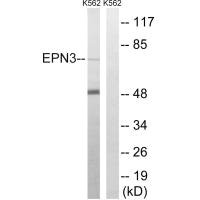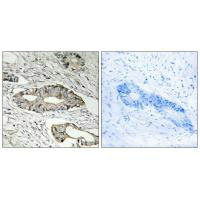EPN3 Antibody
-
货号:CSB-PA243224
-
规格:¥2024
-
图片:
-
其他:
产品详情
-
产品名称:Rabbit anti-Homo sapiens (Human) EPN3 Polyclonal antibody
-
Uniprot No.:Q9H201
-
基因名:
-
宿主:Rabbit
-
反应种属:Human
-
免疫原:Synthesized peptide derived from internal of Human EPN3.
-
免疫原种属:Homo sapiens (Human)
-
克隆类型:Polyclonal
-
纯化方式:The antibody was affinity-purified from rabbit antiserum by affinity-chromatography using epitope-specific immunogen.
-
浓度:It differs from different batches. Please contact us to confirm it.
-
产品提供形式:Liquid
-
应用范围:ELISA,WB,IHC
-
推荐稀释比:
Application Recommended Dilution WB 1:500-1:3000 IHC 1:50-1:100 -
Protocols:
-
储存条件:Upon receipt, store at -20°C or -80°C. Avoid repeated freeze.
-
货期:Basically, we can dispatch the products out in 1-3 working days after receiving your orders. Delivery time maybe differs from different purchasing way or location, please kindly consult your local distributors for specific delivery time.
相关产品
靶点详情
-
基因功能参考文献:
- These results suggested that EPN3 enhances the migration and invasion of glioblastoma cells by activating the transcription factors Slug, Twist and ZEB1, but not Snail 1 or ZEB2, to induce EMT in glioma cells; EPN3 involvement in the Notch and WNT/betacatenin signaling pathways may contribute to this process. PMID: 30226603
- High expression of epsin (EPN3) was associated with increased risk of late metastasis. PMID: 27926932
-
亚细胞定位:Cytoplasm. Cytoplasm, perinuclear region. Cytoplasmic vesicle, clathrin-coated vesicle. Nucleus. Note=Concentrated in the perinuclear region and associated with clathrin-coated vesicles close to the cell periphery. May shuttle to the nucleus.
-
蛋白家族:Epsin family
-
组织特异性:Detected in migrating keratinocytes from wounded skin, but not in differentiating keratinocytes or in normal skin. Detected in chronic wounds, basal cell carcinoma and ulcerative colitis.
-
数据库链接:
HGNC: 18235
OMIM: 607264
KEGG: hsa:55040
STRING: 9606.ENSP00000268933
UniGene: Hs.670090
Most popular with customers
-
-
Phospho-YAP1 (S127) Recombinant Monoclonal Antibody
Applications: ELISA, WB, IHC
Species Reactivity: Human
-
-
-
-
-
-






















